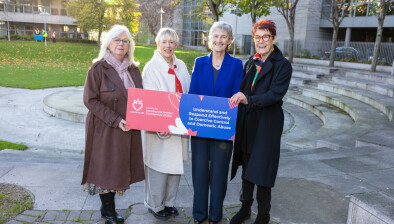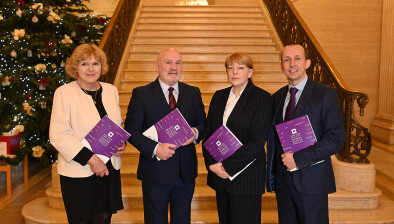High Court: HSE counsellors mandated to report child sexual abuse allegations made by adult service users

The High Court has ruled that the provisions of the Children First Act 2015 require HSE counsellors to report child abuse claims made by adult service users to Tusla.

About this case:
- Citation:[2022] IEHC 541
- Judgment:
- Court:High Court
- Judge:Ms Justice Siobhán Phelan
A 2019 policy published by the HSE required certain “mandated persons” to pass on information to Tusla where there were reasonable grounds for concern that abuse had occurred, was occurring or at risk of occurring.
Delivering judgment in the case, Ms Justice Siobhán Phelan held that the provisions of the legislation were clear and applied to counsellors in the HSE National Counselling Service even where the report, in the counsellor’s opinion, might cause harm to the service user.
Further, it was held that the proper construction of the 2015 Act required a report to be made where an adult disclosed past harm suffered as a child to a counsellor.
Background
The applicant was the Director of Counselling within the HSE in Sligo. He was employed by the HSE’s National Counselling Service, which provided counselling and psychotherapy services for adults who experienced childhood abuse or neglect.
Under section 14(1) of the 2015 Act, where a mandated person knew, believed or had reasonable grounds to suspect that a child had a) been harmed b) was being harmed or c) was at risk of being harmed, the mandated person had to report the matter to Tusla. Counsellors in the NCS fell within the definition of “mandated person”.
Further, section 14(2) provided that where a child believed that they had a) been harmed b) was being harmed or c) was at risk of being harmed, and disclosed that belief to a mandated person, the mandated person was required to report the disclosure to Tusla.
Section 14(3) dealt with certain circumstances in which sexual activity of a minor did not need to be disclosed and section 14(4) addressed the issue of avoiding double reporting by not requiring mandated persons to make a report if the sole basis for their knowledge of abuse was from another mandated person.
In 2019, the HSE circulated a policy regarding historic child sexual abuse. It stated that service users should be informed at the outset that any issue of child protection would be passed on to Tusla where there were reasonable grounds for concern that abuse had occurred. Effectively, all disclosures of child abuse in the context of counselling services had to be reported to Tusla.
The NCS was concerned that the reporting obligations would pose a risk of harm to clients. However, the HSE was satisfied that the policy reflected the legal position under the 2015 Act. As such, the applicant issued proceedings challenging the policy.
The applicant contended that section 14(1) did not require the mandatory reporting to Tusla of information received from an adult regarding incidents which allegedly took place when they were a child. Instead, it was said that section 14(1) only required a counsellor to report alleged abuse when it related to a child at the time of reporting.
In particular, the applicant placed emphasis on the definition of “child” under the 2015 Act, noting that reporting requirements did not extend to minors who were or had been married. It was therefore said that reporting requirements did not apply to the harm of every person who was under 18 and therefore did not apply to persons who may be deemed to be adults. It was contended that a married person under 18 did not qualify as a child within the meaning of the Act.
The Applicant also relied on the changes of tense between sections 14(1) and 14(2). Under 14(2), a report had to be made in respect of abuse by a child who believes (present tense) that they had been abused. As such, it was said that this section was clearly referable to the point in time when a belief was held and the disclosure was made.
High Court
Delivering judgment in the case, Ms Justice Phelan began by noting that her overriding duty was to ascertain the true will and intention of the Oireachtas when interpreting legislation. As such, it was not for the court to assess the policy which underpinned the legislation.
The court identified that there was a broad and narrow interpretation of the relevant provisions. Either 1) a report was required where past harm occurred to a person as a child irrespective of their current age or 2) a report was only required where past harm had occurred to a person who was currently a child.
The court held that the use of the past tense under section 14(1)(a) was important as it referred to situations where a child had been harmed. The court held that this could not be taken to mean that the person had to still be a child at the time of the disclosure for a report to be made.
Further, the provisions under sections 14(1) and 14(2) were intended to cover different situations, the court held. The applicant had submitted that different outcomes could arise from the application of the sections, but this was not absurd or inconsistent “because the statutory criteria triggering a reporting obligation differ as between the two”.
The court took the view that the plain meaning of section 14(1) was that it applied to retrospective disclosures of abuse as children by adults, which was consistent with the mixed use of tenses in the section.
The court also noted that a narrower interpretation would mean that historic abuse cases would not be reported to Tusla and would leave a gap in the State’s reporting mechanisms. The court said: “Such an outcome would seem to me to run counter to the purpose of the reporting requirements under the 2015 Act and is not consistent with a wide and liberal interpretation when regard is had to the purpose of the report” (see Western Health Board v. KM [2002] 2 IR 493).
Since Tusla had a statutory duty to investigate historic abuse claims, section 14(1) could not be interpreted as requiring a report only when the complainant was a child, the court held. In this regard, the court noted that the ECtHR had concluded that the State had previously failed to provide mechanisms which allowed such complaints to be reported and investigated (see O’Keeffe v. Ireland [GC] (35810/09 Judgment 28 January 2014)).
The court commented that the applicant’s problem was that the legislation did not include additional requirements to address the position of counsellors who worked with adult survivors of child abuse. However, the drawing of any distinction between counsellors and other mandated persons was a matter for the Oireachtas (Irish Life and Permanent plc v. Dunne [2016] 1 IR 92).
Conclusion
It was held that the proper interpretation of section 14(1) was that mandated persons must notify Tusla where an adult discloses past harm suffered as a child within the meaning of the Act. While counsellors had to inform users that they were subject to the reporting obligations, it was not necessary for the person to consent to the report being made to Tusla.
McGrath v. The Health Service Executive [2022] IEHC 541










